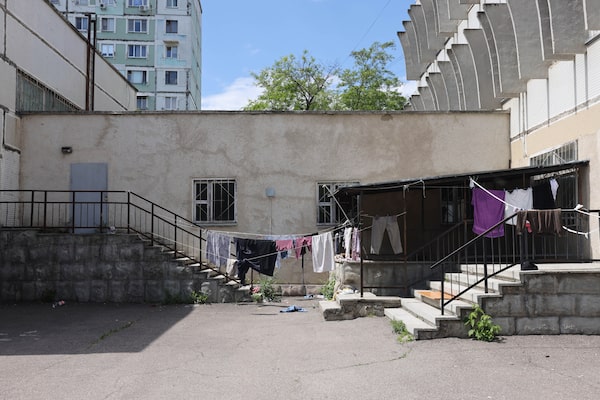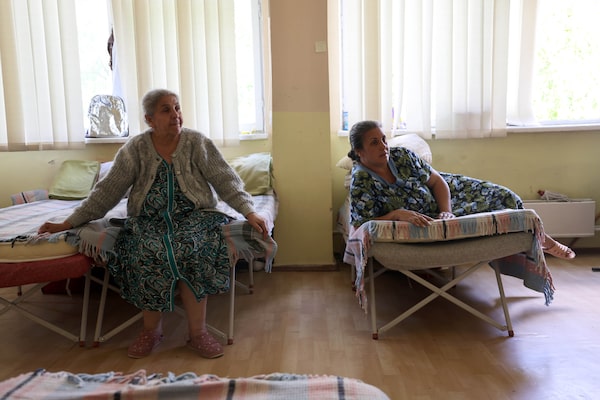
Lida Kalishenko, 70, sits beside her granddaughter Alina, 15, on May 24 in the parking lot of an abandoned university building that has been turned into a segregated refugee centre in Chisinau, Moldova.Janice Dickson/The Globe and Mail
Lida Kalishenko gently pushed and pulled her granddaughter Alina in a wheelchair between the sun and shade in a parking lot.
Ms. Kalishenko, 70, her blind daughter and two granddaughters fled the war in Ukraine two months ago, finding safety in neighbouring Moldova. They were hoping to travel to Germany so Alina, 15, could access treatment. But Ms. Kalishenko doesn’t have the identification documents required to leave the country, so they are all living in limbo.
The family is among the many Romani Ukrainians here in Chisinau, living in classrooms that have been converted into makeshift bedrooms, who cannot leave for that reason. The refugee centre where they are staying houses mostly Roma from Ukraine and people from Azerbaijan – and has been criticized by human-rights advocates for segregating refugees.
Human Rights Watch released a report Wednesday featuring the very building. It says Moldovan authorities are deliberately housing most Romani refugees separately “in a manner that constitutes unequal and discriminatory treatment.”
“Moldovan authorities have offered critical support to people fleeing Ukraine, but that does not excuse segregation of Romani refugees,” said Anastasiia Kruope, the organization’s assistant researcher for Europe and Central Asia, in the report.
Since the war began, more than 473,000 refugees have crossed into Moldova, according to the United Nations High Commissioner for Refugees. Ukraine’s Roma population is about 400,000, and it’s not clear how many have come here, but activists say they are assisting a couple of hundred. Many, like Ms. Kalishenko’s family, have sought refuge in Moldova but want to continue on to other countries.

Janice Dickson/The Globe and Mail

The exterior and interior of the refugee centre in Chisinau, Moldova, which houses mostly Roma from Ukraine and people from Azerbaijan – and has been criticized by human-rights advocates for segregating refugees.Janice Dickson/The Globe and Mail
Ms. Kalishenko said remnants of a rocket hit their home in Mykolaiv and, in the panic, she lost her papers. In the hours after they entered Moldova, the four women could have continued to Western Europe, but Ms. Kalishenko’s older granddaughter, Olya, wanted to stay close to Odesa, near her boyfriend.
Sitting in a wooden chair under the warm sun, Ms. Kalishenko wiped tears from her eyes with one hand and held Alina’s with the other.
“I’m afraid if something happens to me, her grandmother, she needs the most because her mother is blind, so I don’t have much hope. I can only hope that God will somehow help,” she said.
She asked Ukrainian embassy officials for help, and they told her they would look into her case.
Victorina Luca, a human-rights lawyer and founder of the Roma Awareness Foundation, said many Roma coming from Ukraine only have a birth certificate – and some don’t even have that. “These people are stateless,” she said.
She said the Roma living in the segregated refugee centre, an abandoned university building, lack essential items.
This week she brought them water, but she and other volunteers have also provided donations and legal assistance. “I am the one who is assisting them on the ground because they do not know how to read or write,” she said.

Sofia Pulpovici, left, sits beside her daughter, Natalia, in a former university classroom in Chisinau that’s now providing shelter to refugees who fled the war in Ukraine.Janice Dickson/The Globe and Mail
Ms. Luca said her NGO runs a radio station that aims to empower the Roma community and combat discrimination. “Nobody wants to offer rent for Roma families,” she said, “because of the stereotypes and prejudices they have.”
Officials and volunteers offered an explanation for the segregation. Steliana Rudco, a food and goods co-ordinator for Moldova for Peace, an organization that has been providing a range of services for refugees since the war began, said Roma people were facing discrimination and racism in a large refugee centre, so volunteers found a separate space for them.
Ms. Rudco said she understands the segregation concerns, agreeing that the solution is not ideal. “But taking into consideration how the Roma people were treated in cohabitating area, it was much more worse than it is now.”
Nicolae Radita, a human-rights adviser to Moldovan Prime Minister Natalia Gavrilita, said it is not true that Romani people are being segregated, saying there are people of different backgrounds in the same centre.
Madalina Hachi, 19, a co-coordinator of the centre, said that of the 190 people staying there, about 168 are Roma and the others are Azerbaijani.

Evghenia Kalmar, left, has seen some of her family members make it to Germany, while she hopes for a reunion with them soon. 'I feel like I’m at an orphanage,' the 50-year-old says.Janice Dickson/The Globe and Mail
Ms. Hachi said she’s often asked why the centre is housing mostly Roma people. “I think it’s not discrimination,” she said. “Sometimes there are a lot of misunderstandings between Roma people and Ukrainians, and that’s why I think the government divided them like this.”
Inside, a family of 11 shared a classroom. Beds lined the walls, and sisters sat and lay in floral dresses while young men played on their phones.
The family was divided, with some children and relatives having made it to Germany. The 11 who remained behind were sticking together because three of them didn’t have the necessary documents.
“I can’t explain, I feel like I’m at an orphanage,” said Evghenia Kalmar, 50. She said they are grateful they’re not living on the street, but they want to be with their family.
Our Morning Update and Evening Update newsletters are written by Globe editors, giving you a concise summary of the day’s most important headlines. Sign up today.